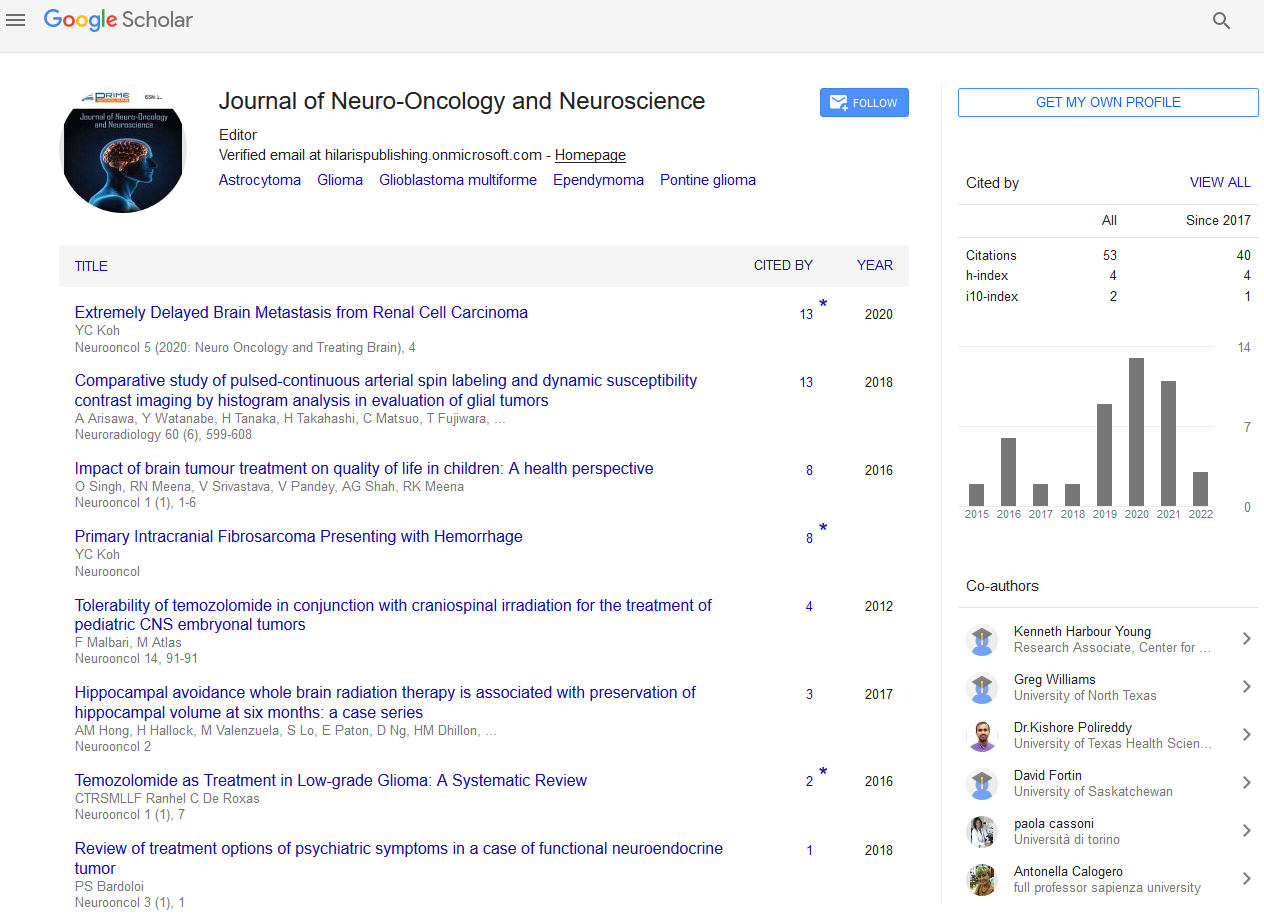Commentary - (2024) Volume 9, Issue 4
Long-Term Cognitive and Functional Outcomes in Survivors of Pediatric Brain Tumors
Enrique Deborah*
Department of Medical Oncology, University of California Irvine, United States of America
*Correspondence:
Enrique Deborah,
Department of Medical Oncology, University of California Irvine,
United States of America,
Email:
Received: 02-Dec-2024, Manuscript No. IPJNO-24-22239;
Editor assigned: 04-Dec-2024, Pre QC No. IPJNO-24-22239 (PQ);
Reviewed: 18-Dec-2024, QC No. IPJNO-24-22239;
Revised: 23-Dec-2024, Manuscript No. IPJNO-24-22239 (R);
Published:
30-Dec-2024, DOI: 10.21767/2572-0376.9.4.34
Introduction
Pediatric brain tumors are among the most common childhood
cancers, and advances in surgery, radiation, and chemotherapy
have significantly improved survival rates. However, surviving
a brain tumor often comes at a cost. Long-term survivors
frequently face cognitive, emotional, and functional challenges
that impact their quality of life. Understanding and addressing
these outcomes are essential for optimizing survivorship care
and fostering meaningful recovery. The brain’s developmental
trajectory during childhood makes pediatric patients particularly
vulnerable to cognitive impairments. Tumor location, treatment
modalities, and the age at diagnosis collectively influence the
degree and nature of cognitive deficits. Survivors commonly
experience deficits in attention, memory, processing speed,
and executive function. For example, damage to the prefrontal
cortex or exposure to cranial radiation can impair working
memory and problem-solving skills. These challenges often
manifest as difficulties in academic performance, requiring
tailored educational interventions. Longitudinal studies have
observed declines in IQ among survivors, particularly those
treated with cranial irradiation.
Description
Tumor location and surgical interventions may result in motor
impairments, such as hemiparesis or ataxia, and sensory deficits,
including vision or hearing loss. Rehabilitation programs,
including physical and occupational therapy, play a critical role
in restoring function and independence. Treatments involving
the hypothalamic-pituitary axis can lead to growth hormone
deficiencies, hypothyroidism, and other endocrine disorders.
These complications can affect physical development, energy
levels, and overall quality of life. Many survivors experience
anxiety, depression, and social withdrawal. The emotional toll
of living with a history of cancer, coupled with cognitive and
physical challenges, underscores the importance of mental
health support. Behavioral issues, such as impulsivity or
difficulty with peer interactions, are also common. Tumors in
the cerebellum can affect motor coordination, while those in
the frontal lobes impact executive functions. Younger patients
are more vulnerable to treatment-related neurotoxicity, as
their brains are still developing.
Conclusion
Survivors of pediatric brain tumors face a myriad of long-term
cognitive and functional challenges, profoundly impacting
their quality of life. Through early intervention, personalized
rehabilitation, and advances in treatment, these challenges
can be mitigated, enabling survivors to lead fulfilling lives. The
evolving field of survivorship care must continue to prioritize
research, innovation, and comprehensive support to bridge the
gap between survival and recovery in pediatric neuro-oncology.
As survival rates continue to improve, the focus of pediatric
neuro-oncology must expand to include long-term quality
of life. Biomarker research may enable clinicians to predict
which patients are most at risk for cognitive decline, allowing
for personalized interventions. Additionally, integrating
technology, such as virtual reality-based rehabilitation or
AI-driven neurocognitive assessments, holds promise for
enhancing care delivery.
Acknowledgement
None.
Conflict Of Interest
The author declares there is no conflict of interest in publishing
this article.
Citation: Deborah E (2024) Long-term Cognitive and Functional Outcomes in Survivors of Pediatric Brain Tumors. Neurooncol. 9:34.
Copyright: © 2024 Deborah E. This is an open-access article distributed under the terms of the Creative Commons Attribution License, which permits unrestricted use, distribution, and reproduction in any medium, provided the original author and source are credited.

